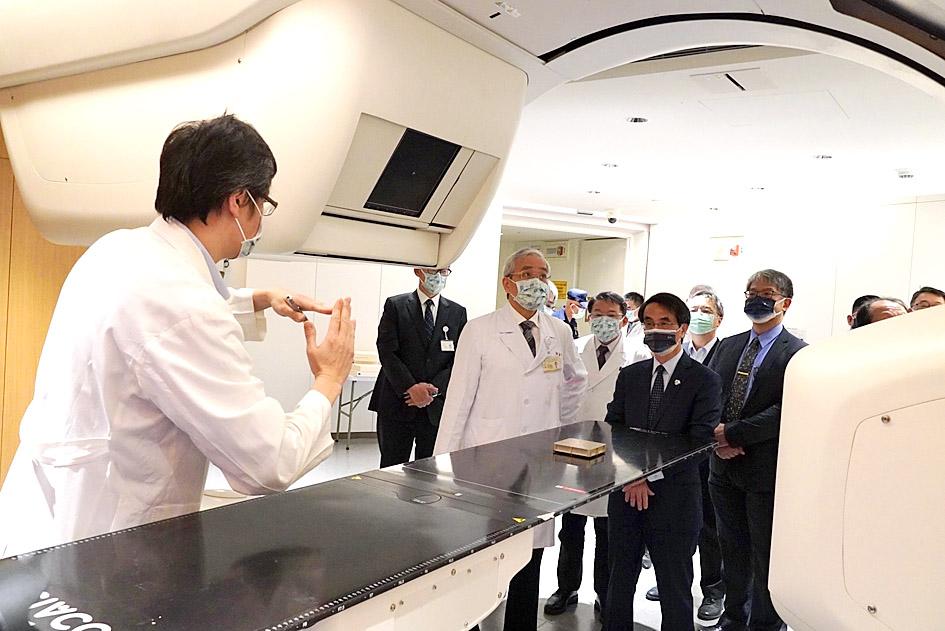Taiwan’s space program plans to use medical devices to test the effects of radiation on electronics in Taiwanese satellites, the National Space Organization (NSPO) said on Wednesday last week.
The NSPO has signed a memorandum of understanding (MOU) with Taipei Veterans General Hospital to use its Heavy Particle Therapy Center to simulate the radiation environment of space in certification tests, the agency wrote in a news release.
Satellite components must be hardened against radiation, as particle strikes can trigger malfunctions, from failures that require a system reboot to incidents that disable mission-critical components, the agency said.

Photo provided by the National Applied Research Laboratories
With the Ministry of Science and Technology pushing to have 60 percent of the components in locally produced satellites made in Taiwan, the nation must have independent capability to test the radiation resistance of its electronics, it said.
Although the agency in 2020 founded an alliance to promote testing of components for their ability to continue working in the heightened radioactivity levels of space, a lack of specialist equipment has meant Taiwan has had to rely on foreign labs, especially in the US or European countries, the agency said.
Closing the testing capability gap via the MOU would trim a week from the six-month certification process and save money, NSPO Director-General Wu Jong-shinn (吳宗信) said.
The collaboration would help boost the research and development capabilities of the aerospace industry and increase Taiwan’s contribution to space science, hospital director Chen Wei-ming (陳威明) said.
The alliance welcomes the participation of medical institutions in the country’s drive to develop its aerospace industry, said Lin Bou-wen (林博文), acting president of National Applied Research Laboratories, a member of the testing alliance.
The government, academia and private enterprises must improve their partnerships for the indigenous space industry to succeed, Lin said.

Three batches of banana sauce imported from the Philippines were intercepted at the border after they were found to contain the banned industrial dye Orange G, the Food and Drug Administration (FDA) said yesterday. From today through Sept. 2 next year, all seasoning sauces from the Philippines are to be subject to the FDA’s strictest border inspection, meaning 100 percent testing for illegal dyes before entry is allowed, it said in a statement. Orange G is an industrial coloring agent that is not permitted for food use in Taiwan or internationally, said Cheng Wei-chih (鄭維智), head of the FDA’s Northern Center for

LOOKING NORTH: The base would enhance the military’s awareness of activities in the Bashi Channel, which China Coast Guard ships have been frequenting, an expert said The Philippine Navy on Thursday last week inaugurated a forward operating base in the country’s northern most province of Batanes, which at 185km from Taiwan would be strategically important in a military conflict in the Taiwan Strait. The Philippine Daily Inquirer quoted Northern Luzon Command Commander Lieutenant General Fernyl Buca as saying that the base in Mahatao would bolster the country’s northern defenses and response capabilities. The base is also a response to the “irregular presence this month of armed” of China Coast Guard vessels frequenting the Bashi Channel in the Luzon Strait just south of Taiwan, the paper reported, citing a

UNDER PRESSURE: The report cited numerous events that have happened this year to show increased coercion from China, such as military drills and legal threats The Chinese Communist Party (CCP) aims to reinforce its “one China” principle and the idea that Taiwan belongs to the People’s Republic of China by hosting celebratory events this year for the 80th anniversary of the end of World War II, the “retrocession” of Taiwan and the establishment of the UN, the Mainland Affairs Council (MAC) said in its latest report to the Legislative Yuan. Taking advantage of the significant anniversaries, Chinese officials are attempting to assert China’s sovereignty over Taiwan through interviews with international news media and cross-strait exchange events, the report said. Beijing intends to reinforce its “one China” principle

A total lunar eclipse, an astronomical event often referred to as a “blood moon,” would be visible to sky watchers in Taiwan starting just before midnight on Sunday night, the Taipei Astronomical Museum said. The phenomenon is also called “blood moon” due to the reddish-orange hue it takes on as the Earth passes directly between the sun and the moon, completely blocking direct sunlight from reaching the lunar surface. The only light is refracted by the Earth’s atmosphere, and its red wavelengths are bent toward the moon, illuminating it in a dramatic crimson light. Describing the event as the most important astronomical phenomenon